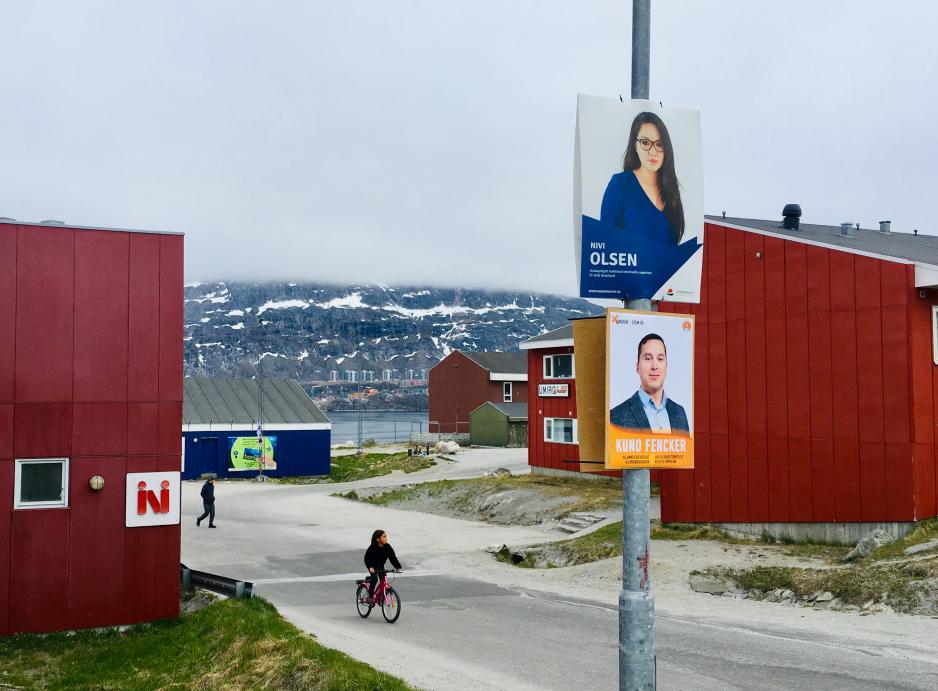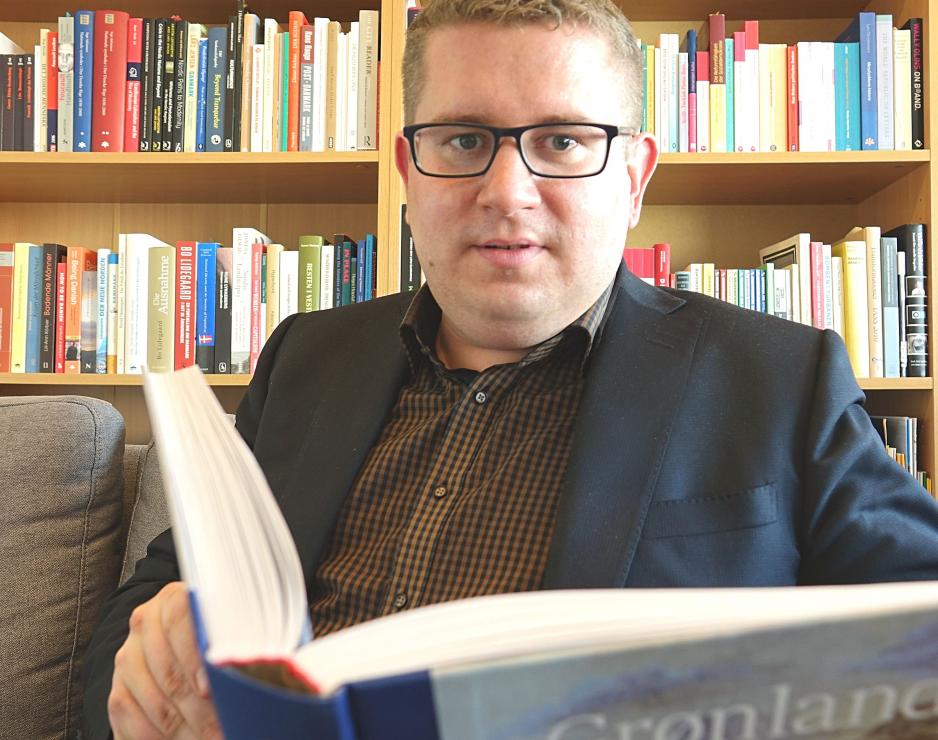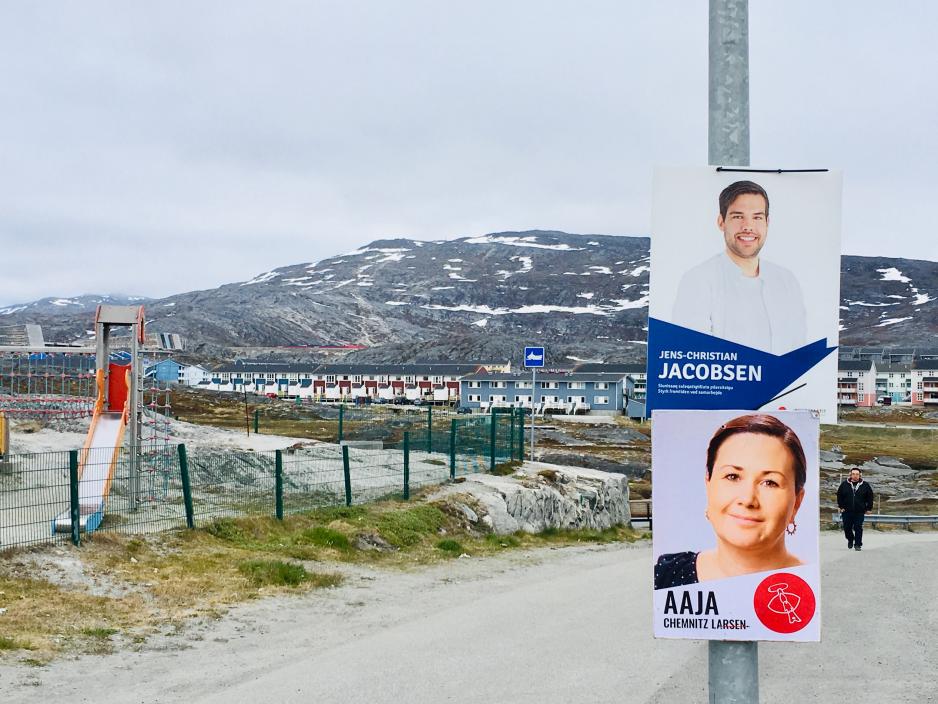Future independence, Arctic minister and social issues on the agenda as Greenland goes to polls in Danish elections

Election campaigns in Nuuk, Greenland (Photo: Ebbe Volquardsen)
Despite the relatively low interest in the Danish Folketing election in Greenland, the results can potentially have implications for the direction of the future relationship between Greenland and Denmark.
On June 5, Denmark will elect 179 members for its national parliament – Folketinget – two of which are from Greenland. The future relationship between Greenland and Denmark has been a central topic of the past few weeks’ election campaigns in Greenland.
“With Greenland becoming more autonomous, and having both its own Greenlandic parliament as well as representatives in the Danish parliament, there is naturally less interest in the Danish elections than in those for the Greenlandic national parliament”, says Ebbe Volquardsen, who is an Assistant Professor of Cultural History and Head of the Department of Cultural and Social History at the University of Greenland in Nuuk.
Greenland in Folketinget
- Greenland has two representatives in the Danish parliament, Folketinget
- In the Danish election taking place on 5 June 2019, 7 Greenlandic parties and 19 candidates are running
- Greenland has its own parliament (Inatsisartut) and has gained more autonomy over that last decades. However, some matters, such as foreign relations and defense are still under the control of Danish government.
- The two representatives from Greenland are a part of the Greenland Committee with one representative from each of the other parties in Folketinget. The Committee discusses bills and motions that apply to Greenland or have a significance to Greenland before they are sent to Folketinget.
50,4 per cent of eligible Greenlandic citizens voted in the Danish election in 2015, while 72 per cent voted in the election for the Greenlandic parliament Inatsisartut in 2018.
Creating awareness of Greenlandic matters in Denmark
One important topic in the election debate in Greenland is the future relationship between Greenland and Denmark, explains Volquardsen.
One of the main tasks of the Greenlandic representatives to the Danish Folketing, he says, is to create awareness of Greenlandic matters in Danish politics and among other Danish parties.
The Greenlandic representatives can do this through the Greenland Committee in Folketinget, where the two Greenlandic representatives sit with one member of each of the other parties in the parliament. The Committee addresses a range of topics that is related to Greenland before these cases go to the parliament.
Slow or fast independence?
Also Danish politicians have given some attention to the discussion about the future relationship with Greenland. Volquardsen argues that the increasing global interest in the Arctic over the last years has made the Danish relationship with Greenland even more important.
“When you follow the discussions on Arctic matters among Danish politicians, it has become clear that a future Greenlandic independence now at least is seen as a possibility, which has changed the ways in which Danish-Greenlandic relations are addressed”, says Volquardsen.
There is a consensus among the majority of Greenlandic political parties that the country should strive for independence, but they disagree on the pace of the process. Whereas the two largest political parties in the Greenlandic Parliament, Siumut and Inuit Ataqatigiit, argue that economic independence has to precede political autonomy, some of the smaller parties like Nunatta Qitornai and Partii Naleraq are advocates for a faster process towards independence.
Securing Danish influence in the Arctic
Volquardsen says that Danish politicians are watching the political discussions in Greenland closely and at the same time trying to figure out how Denmark can continue to have a close relationship and collaboration with Greenland in order to secure its influence in the Arctic region.

Ebbe Volquardsen, Assistant Professor of Cultural History at the University of Greenland in Nuuk (Photo: University of Greenland)
The Danish parties have different approaches on how to handle the country’s relations with Greenland.
“The center-left social democratic candidate Mette Frederiksen has been slightly more open to the idea of more autonomy, for example on the field of foreign politics, without being very concrete”, says to Volquardsen.
Mette Frederiksen and the Social Democrats are currently in opposition, but are expected to do well in Wednesday’s elections.
According to Volquardsen, the current center-right Prime Minister Lars Løkke Rasmussen has been more reluctant to open up for any discussions about alternative models of a looser Community of the Realm. Rasmussenhas has been highly critical of the ongoing work on a Greenlandic constitution and has made it clear that the Danish block grant paid to the Greenlandic government will be stopped immediately if the constitution is implemented.
Meanwhile, Mette Frederiksen has argued that there might be a middle way, and that there is room for interpretation of the Danish constitution that might secure Greenland more autonomy on for example foreign politics, while remaining a part of the union with Denmark.
An Arctic minister
Another topic where both the Danish and Greenlandic parties have differing views is the question of an Arctic minister.
The Greenlandic party Inuit Ataqatigiit (IA), which is currently represented in the Danish parliament, has suggested an Arctic minister post, also arguing that the post should be held by a Greenlandic candidate.
Also read
“If Denmark proclaims to be an Arctic power, it should also have an Arctic minister – and that minister should come from the Arctic”, writes Aqqalukkuluk Fontain, one of the candidates from IA, in a press release.
Current Prime Minister Lars Løkke Rasmussen is however skeptical of the suggestion, and has said that there will be no Arctic minister if he is reelected.
Many of the other Greenlandic parties have also been critical of the idea of an Arctic minister post. Volquardsen explains that Greenlandic politicians tend to view the minister post as a step in the wrong direction:
“They have argued that the Arctic minister post would give a lot of responsibility back to the Danish government. In their view, having a Greenlandic minister in the Danish government is contradictory to the ambition to install the Greenlandic government as the decision-making body for the Community of the Realm’s Arctic politics”, says Volquardsen.
Sexual abuse and suicide prevention on the agenda
Social issues, in particular sexual abuse against children and the lack of action from the Greenlandic government and local authorities has been one of the most important topics in the current election campaign in Greenland.
The issue has been brought to the surface through a documentary by the Danish TV channel DR called “The city where children disappear” (Byen hvor børn forsvinder). In the city Tasiilaq in South-Eastern Greenland, one out of five dies of suicide. This is often connected to sexual abuse in the childhood, and the documentary shows that most of the victims have not received sufficient or any help from social services.
The documentary, Volquardsen says, has changed the agenda of election campaigns considerably. Calls for immediate action by the political competitors have led the Greenlandic opposition to accuse the government of being too proud to ask the Danish authorities for assistance on this matter, without specifying how such assistance could look like.

Election campaigns in Nuuk, Greenland (Photo: Ebbe Volquardsen)

